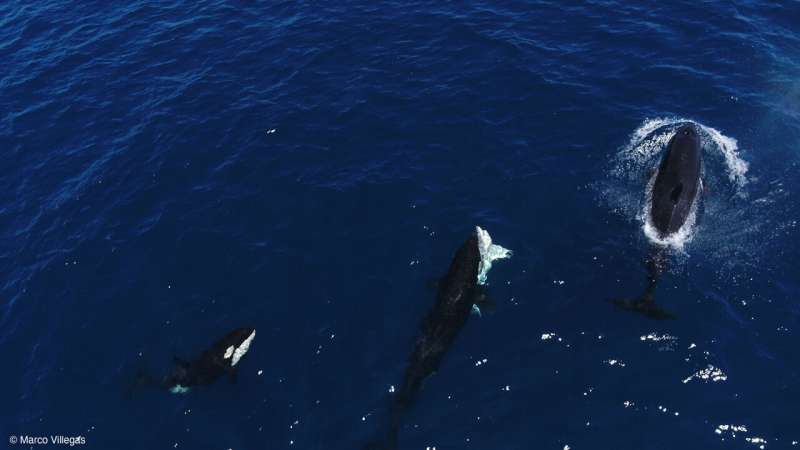Science
Orcas Capture Young Great White Sharks in Gulf of California

A specialized pod of orcas, known as Moctezuma’s pod, has been observed hunting and killing young great white sharks in the Gulf of California. These orcas employ a unique hunting technique, flipping the sharks upside-down to access their nutrient-rich livers, according to a study published in Frontiers in Marine Science.
Researchers captured footage of two hunts resulting in the deaths of three juvenile great white sharks, with the orcas demonstrating an advanced strategy that highlights their intelligence and social learning. Erick Higuera Rivas, marine biologist and project director at Conexiones Terramar and Pelagic Life, emphasized the significance of these findings, stating, “Orcas that eat elasmobranchs—sharks and rays—could eat a great white shark if they wanted to, anywhere they went looking for one.”
Strategic Hunting Techniques
During the first documented hunt in August 2020, five orcas were seen cooperating to pursue a juvenile white shark, driving it to the surface and turning it upside-down. They then submerged, emerging with the shark’s liver. A similar scenario unfolded in a second hunt in August 2022, where the orcas again flipped a juvenile shark to access its liver. This hunting method induces a state called tonic immobility, which leaves the shark defenseless, allowing the orcas to consume its organs while abandoning the rest of the carcass.
Dr. Salvador Jorgensen, a co-author of the study and researcher at California State University, noted that adult great white sharks tend to flee from orcas, often vacating their seasonal habitats. In contrast, juvenile sharks may lack the experience to evade such predators, which could make them more vulnerable.
Environmental Changes and New Opportunities
The increasing presence of juvenile great white sharks in the Gulf of California may be linked to changes in their nursery areas due to climate events, such as El Niño. These shifts could present new hunting opportunities for Moctezuma’s pod, as each new cohort of sharks could become seasonal targets.
Future research is planned to assess the full dietary habits of this orca pod. Dr. Francesca Pancaldi, co-author and researcher at the Instituto Politécnico Nacional Centro Interdisciplinario de Ciencias Marinas, highlighted the challenges of this research, stating, “Fieldwork is expensive and orca hunts are unpredictable.”
The study findings underscore the need for further investigation into the orcas’ hunting behaviors and their ecological implications, as understanding these dynamics can inform conservation efforts and management plans aimed at mitigating human impact on marine ecosystems.
For more information, readers can access the full article titled “Novel evidence of interaction between killer whales (Orcinus orca) and juvenile white sharks (Carcharodon carcharias) in the Gulf of California, Mexico,” published in Frontiers in Marine Science.
-

 Top Stories1 week ago
Top Stories1 week agoMarc Buoniconti’s Legacy: 40 Years Later, Lives Transformed
-

 Sports3 weeks ago
Sports3 weeks agoSteve Kerr Supports Jonathan Kuminga After Ejection in Preseason Game
-

 Politics3 weeks ago
Politics3 weeks agoDallin H. Oaks Assumes Leadership of Latter-day Saints Church
-

 Science3 weeks ago
Science3 weeks agoChicago’s Viral ‘Rat Hole’ Likely Created by Squirrel, Study Reveals
-

 Business3 weeks ago
Business3 weeks agoTyler Technologies Set to Reveal Q3 2025 Earnings on October 22
-

 Lifestyle3 weeks ago
Lifestyle3 weeks agoKelsea Ballerini Launches ‘Burn the Baggage’ Candle with Ranger Station
-

 Entertainment3 weeks ago
Entertainment3 weeks agoZoe Saldana Advocates for James Cameron’s Avatar Documentary
-

 Lifestyle3 weeks ago
Lifestyle3 weeks agoDua Lipa Celebrates Passing GCSE Spanish During World Tour
-

 Health3 weeks ago
Health3 weeks agoRichard Feldman Urges Ban on Menthol in Cigarettes and Vapes
-

 Health3 weeks ago
Health3 weeks agoCommunity Unites for Seventh Annual Mental Health Awareness Walk
-

 World3 weeks ago
World3 weeks agoD’Angelo, Iconic R&B Singer, Dies at 51 After Cancer Battle
-

 Sports3 weeks ago
Sports3 weeks agoPatriots Dominate Picks as Raiders Fall in Season Opener









